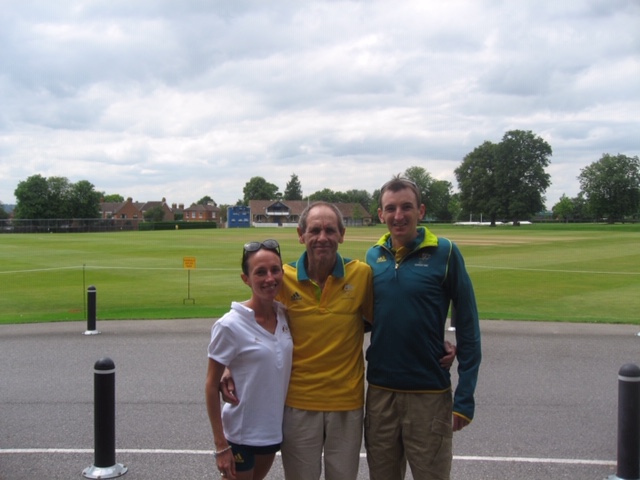
Dick Telford with his two current, multiple Commonwealth Games marathon runners, Michael Shelley and Lisa Weightman. Photo: Tim Gavel.
At 73 years of age, Dick Telford is showing no sign of slowing down. In fact, if anything, these days his life is driven by his passion to improve ‘physical literacy’ in children.
His life seems to be as packed and fast-paced as ever. I say this because Dick appears to have packed five lives into one.
In 1968 he won the prestigious Liston Trophy as the best and fairest player in the Victoria Football Association (VFA). Fifty years later, Dick is about to be inducted into the ACT Sports Hall of Fame as an associate member.
It is due recognition in as much for the role he has played in Australian sport as the part he is currently playing with his ground-breaking research into the link between physical activity, physical and psychological wellbeing, and academic achievement.
That is not to underplay the role he has played in sport. He played a game for Collingwood, won the J.J. Liston trophy for best player in the VFA (now called VFL), and was Coaching Coordinator/Manager of the Victorian Shield Cricket team, which won back-to-back titles. He was appointed the first sports scientist at the AIS and has coached athletes to five gold medals at the Commonwealth Games, as well as coaching Lisa Martin to win Australia’s one and only medal in the Olympic marathon.
Dick says many things have happened by chance, including being approached to coach the Victorian Shield cricket team, being approached to coach Preston in the VFA, not to mention being approached by AIS director, Don Talbot, with an on-the-spot offer of inaugural sport scientist.
He still coaches Australia’s top marathon runners, Michael Shelley and Lisa Weightman, and another five athletes from around Australia, alongside up to 20 athletes here in Canberra.
Dick is a Professorial Fellow at the University of Canberra’s Research Institute for Sport and Exercise (UCRISE). His team, which includes his son Dr Rohan Telford, together with Dr Lisa Olive, has been conducting pioneering research into ‘Physical Literacy’ through their well-published Australian Lifestyle of our Kids (LOOK) Study.
The LOOK Study addresses not just how physical activity improves NAPLAN scores but also provides a template for a healthy life.
Dick is campaigning to get more physical education and physical activity back into government primary schools. He says that in some cases physical education is currently as little as 35 minutes a week and completely undervalued in the education of our youth, and detracting from the health of our nation. He is however encouraged by his group’s collaboration with Sport Australia (formerly the Australian Sports Commission), feeling that the Sport Australia Sporting Schools program, can form beneficial links with physical education and sporting organisations to improve physical literacy in all Australian children.
Professor Telford is a living example of good health, these days running 35 to 40 minutes a day up Red Hill while listening to French language podcasts.
Perhaps this is an indication as to his next phase in his busy life.













